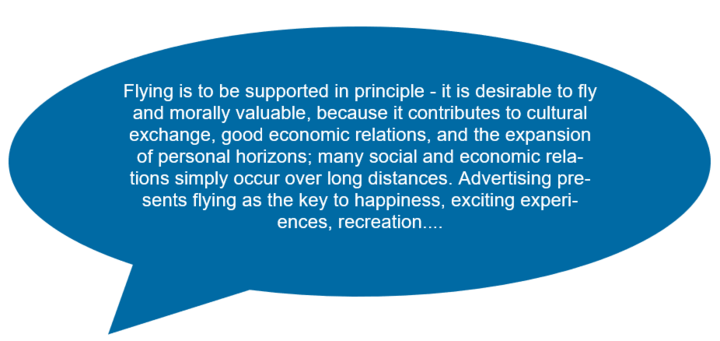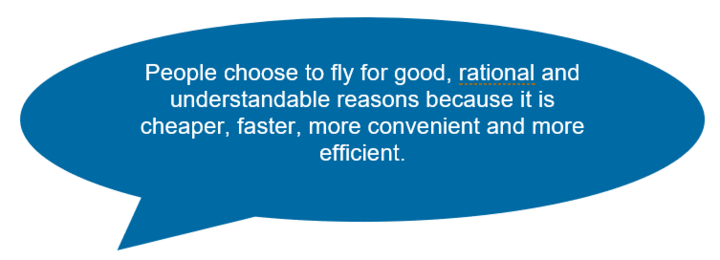Re-thinking – a different perspective on flying
The norms and discourses about flying that we encounter every day have established a positive image of flying in our minds. These “mental infrastructures” act as habits to which we orient ourselves and which guide our thoughts and actions. What alternatives are there to these established discourses and how can we orient ourselves more strongly to them?

This is not true – flying is reserved for a small group of privileged people. Even in Germany, 6% of the population rarely or never fly, and for low-income groups, the figure is as high as 83%. Only a small share of human beings has sat in an airplane. How often people fly depends strongly on their income. Therefore, the subsidies for aviation mainly benefit people with high incomes, who fly more than people with lower incomes.

This is only partially true. The opportunity to fly creates economic value in many ways. However: the economic and environmental consequences of climate heating for large numbers of people in the world are disastrous. In addition, flying is highly subsidized compared to other modes of transport.

We should question flying as a social norm. If we see climate protection and a moderate personal environmental footprint as a criterion for responsible and ethical action, the positive image of flying crumbles. In addition, terran travelling - that is, down-to-earth movement without airplanes - often leaves more time to engage with the places where we are. It also lends itself to visiting interesting places on the way from A to B that are otherwise only flown over. Slow travel can contribute more to intercultural understanding than a fast flight to a distant destination. For social relationships over very long distances, we will continue to depend on airplanes in the future. With the aim of acting more environmentally, we should always consider in which cases we can make long journeys less frequently and stay longer in one place.

This perspective is supported by cheap flights, incentives for frequent flyers and discourses on economic development and intercultural communication. Of course, no one wants to miss out on getting to know the world. But at the same time, a framework must be set for our transport behaviour from an ethical perspective. We don’t have to be ashamed of every flight per se, but we should personally weigh up whether flying is necessary for us and whether the benefit of a flight is greater than the harm done to the climate. It is challenging to decide to fly less. At least for longer distances, the alternatives are more expensive, more uncomfortable, take longer, and you may have to substantiate them to friends or colleagues. But: for many journeys there are good alternatives. For short and medium distances, rail travel is now almost as fast. Relaxation can also be found in slower travel to destinations that are not as far away: a train journey can already bring about moments of relaxation as well as time for reading, thinking, playing and talking; it also offers more space than a cramped airplane. A train journey also provides the opportunity to work longer and with less disturbance because no check-in procedure is necessary and electrical devices like laptops cannot be used continuously on the plane.
Ultimately, policymakers bear a great deal of responsibility for implementing climate protection and adjusting the relevant parameters. Only political regulation sets rules for everyone and does not leave our actions to personal moral judgment alone. Nevertheless, individual action and political regulation influence each other. Without clear signals from society that many people are in favour of rules for more climate protection and are prepared to change their behaviour, politics will barely change.
Re-thinking transport behaviour
As long as politicians do not act, we must do something voluntarily. To do this, we need to question established patterns of thought and action. There are movements that are trying to establish alternative discourses and anchor alternatives more firmly in our minds. The association terran e.V., for example, is committed to spreading the concept of terran travel.
The debate about flight shame has prompted people to re-think their transport behaviour and increased social awareness about the climate impact of flying. In Germany, it almost certainly contributed to a significant reduction in the number of domestic flights in 2019. The same can be observed in Sweden. This is not just about flying per se. It is also about the reasonableness of taking a flight in terms of the distance traveled, the reason for the trip, and the frequency with which a person boards a plane.
In addition, our personal behavior influences other people because it is a first sign of possible change. In a study conducted by Cardiff University, for example, half the people surveyed said they had changed their flying behaviour because someone in their circle of acquaintances had given up flying altogether for climate reasons. Another study concludes that researchers with a low environmental footprint are perceived as more credible because they fly less than those with a high footprint.
At the same time, we should not focus the debate about the future of air transport on personal renunciation. While flying is a privilege for a minority of the world’s population, it is also a privilege to be able to choose not to fly if one can pay more for other modes of transport, if family members live nearby and do not have to move far away to look for work, and if one’s passport is not an obstacle to cross-border journeys. Those who have this privilege should take advantage of it but should not pass judgment on others’ occasional flights.
Links
-
Attari, S. Z.; Krantz, D. H.; Weber, E. U. (2016): Statements about climate researchers’ carbon footprints affect their credibility and the impact of their advice. In: Clim.Change 138 (1-2), p.325–338. DOI: 10.1007/s10584-016-1713-2.
-
ISOE (2020): Zur Legitimität des Fliegens. Eine Diskurserweiterung der Flugscham-Debatte.
-
Gössling, Stefan; Hanna, Paul; Higham, James; Cohen, Scott; Hopkins, Debbie (2019): Can we fly less? Evaluating the ‘necessity’ of air travel. In: Journal of Air Transport Management 81. DOI: 10.1016/j.jairtraman.2019.101722
-
Ivanova, Diana; Wood, Richard (2020): The unequal distribution of household carbon footprints in Europe and its link to sustainability. In: Global Sustainability 3, p.1–12. DOI: 10.1017/sus.2020.12
-
Westlake, S. (2017): A Counter-Narrative to Carbon Supremacy: Do Leaders Who Give Up Flying Because of Climate Change Influence the Attitudes and Behaviour of Others? In: SSRN Journal. DOI: 10.2139/ssrn.3283157